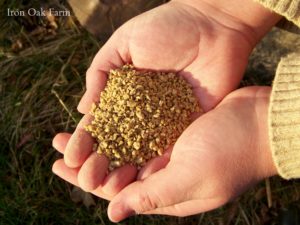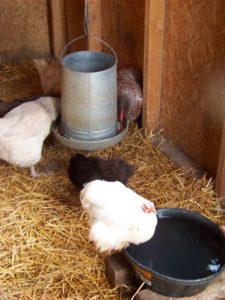 At the minimum, a well balanced, age-appropriate chicken feed will provide a complete source of nutrition for your flock. I say “age-appropriate,” because chickens need different levels of protein at different ages. For example, chicks and young chickens need higher protein levels as they grow than adult birds. Meat birds also need additional protein to get them to maximum table weight.
At the minimum, a well balanced, age-appropriate chicken feed will provide a complete source of nutrition for your flock. I say “age-appropriate,” because chickens need different levels of protein at different ages. For example, chicks and young chickens need higher protein levels as they grow than adult birds. Meat birds also need additional protein to get them to maximum table weight.
A quality layer feed should have a good nutritional balance to keep a healthy flock. But in addition, there are things you can do to give your chickens an added health boost. Especially in hard times of the year like winter, molting season or in the heat of summer.
Below are a number of supplements that you can offer your flock to ensure happy, healthy hens.
Grit. Grit is a necessity to chickens that are not free-range, or who do not have access to dirt or gravel. In the wild, chickens with pick up small pieces of gravel where they store it in their gizzard. These small pieces of gravel act like teeth and help to break the chicken’s food into smaller pieces.
How to feed: Grit can be offered free choice in a separate container from their food.
Calcium. Calcium is essential to proper eggshell formation. Most layer feeds have a calcium additive and should be enough for your chickens. Calcium is important because if a hen isn’t getting enough she will start to pull calcium from her bones in order to produce eggshells. If you notice soft shell eggs (eggs that have a rubbery shell rather than a hard one) it’s time to offer a calcium supplement. You can feed dried crushed eggshells back to your hens, or you can purchase an oyster shell supplement from most feed stores that carry chicken products.
How to feed: Calcium can be offered free choice in a separate container from their food
 Apple Cider Vinegar. Apple cider vinegar has a plethora of health points to offer. It helps thin mucus if your chickens are suffering from respiratory issues. It helps with digestion, and it can alkalize the body making internal parasites uncomfortable.
Apple Cider Vinegar. Apple cider vinegar has a plethora of health points to offer. It helps thin mucus if your chickens are suffering from respiratory issues. It helps with digestion, and it can alkalize the body making internal parasites uncomfortable.
Not all apple cider vinegar is the same. The most healthy is the kind with the “Mother” still intact. The mother is the live bacteria in the vinegar from which most of the health benefits come. Brands like Braggs are a good choice.
How to feed: ACV can be added 1 Tbsp to a gallon of fresh water. This should be rotated with plain water every other day or so.
 Electrolytes. Electrolytes are a perfect addition anytime your flock is feeling stressed. Extreme heat, illness, being transported or any additions to the flock. Adding an electrolyte to the water will help replenish lost minerals during stressful situations.
Electrolytes. Electrolytes are a perfect addition anytime your flock is feeling stressed. Extreme heat, illness, being transported or any additions to the flock. Adding an electrolyte to the water will help replenish lost minerals during stressful situations.
How to feed: Packaged electrolytes can be found in most feed stores read package directions for amounts.
 Probiotics. Probiotics help with your chicken’s immune systems and digestive health. They can be added to the drinking water or sprinkled over your flock’s food.
Probiotics. Probiotics help with your chicken’s immune systems and digestive health. They can be added to the drinking water or sprinkled over your flock’s food.
How to Feed: Probiotic powders can be purchased at most feed stores. Read the package labels for directions.
Garlic. Garlic is great for fighting disease. Especially respiratory issues that can creep up in the wintertime.
How to feed: fresh garlic can be chopped and mixed into the feed, or powdered garlic can be used as well. 1 Tbsp per gallon of feed.
Diatomaceous earth: We don’t personally use diatomaceous earth (DE) with our flock. I have reservations as to how effective it is as an internal supplement and also how it impacts the respiratory system of both the chicken and the person administering it, but many people swear by it. I personally think that it would be better used outside the bird (to roll in) for external parasites. I encourage you to do your own research and decide for yourself.
“Diatomaceous earth is made from the fossilized remains of tiny, aquatic organisms called diatoms.” The diatoms are crushed into a fine powder and can be used as a supplement in this form. They contain natural silica which is essential for joint and cartilage formation. It’s also believed that DE can help rid the system of parasites by making small cuts on the exoskeleton of the parasite, which kills it.
How to Feed: Only use food grade DE. Be sure to wear a respiratory mask when working with DE. Sprinkle 1-2 Tbsp per gallon of feed and mix.
Molasses: Molasses is a great source of iron and other minerals. It also helps other supplements like DE, probiotics, and garlic powder to stick to the feed which helps with intake.
How to feed: add a 1/4 cup to a gallon feed and mix well.
 Protein: During the winter months, or molting season, chickens benefit from extra protein in their diet. Mealworms or scrambled eggs make great additions.
Protein: During the winter months, or molting season, chickens benefit from extra protein in their diet. Mealworms or scrambled eggs make great additions.
How to feed: 1 scrambled egg per chicken 2-3 times per week. 1 tbsp mealworms per chicken 2-3 times per week. (You can’t really overfeed these protein additions)
What supplements do you use with your flock? Share your suggestions by leaving a comment below or visit the Community Chickens Facebook.













1 Comment
To ensure a healthy flock, a good layer of feed should have a decent nutritional balance. However, there are several things you may do to improve the health of your hens. Thank you!